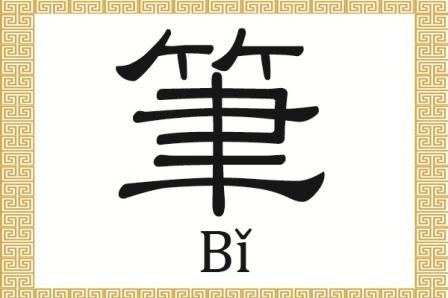The Chinese character 筆 (bǐ) originally referred to a brush pen made of animal hair and a bamboo shaft. The upper part of the character is the bamboo radical (竹); the lower part 聿 is adapted from the Oracle script , which resembles a hand holding a bamboo shaft.
Today, the character 筆 refers to all kinds of pens. When combined with other characters, it makes up words that have something to do with writing and drawing, such as 筆名 (bǐ míng), or pseudonym, and 神來之筆 (shén lái zhī bǐ), a God-like creation.
The character 筆 also signifies the profession of writing. Traditional Chinese culture was known as a “divinely imparted culture.” According to traditional Chinese beliefs, every profession that existed in the human world was created by Gods, and each profession had a deity in charge of it to guide people drawn to that calling.
The deity of the pen, similar to muses in Western culture, bestows upon writers their inspiration and writing talents. This belief has been presented through other art forms, such as the dance Legend of the Brush from the world-class, Chinese spectacular “Shen Yun” 2011, which presents how a deity passed the pen and writing skills to the ancient Chinese people.
There is a very famous folk story about the brush pen: 神筆馬良 (shén bǐ mǎ liáng),” or The Magic Brush. The story is about a poor little boy named Ma Liang. One day, he obtained a magic brush pen from a deity. The brush pen is also used for ink painting, and everything the boy drew with the brush pen came to life.
Having received such a precious gift, Ma Liang only used the brush pen to do good deeds, such as helping the weak and upholding justice, instead of using it for fame, money, and other personal interests.




